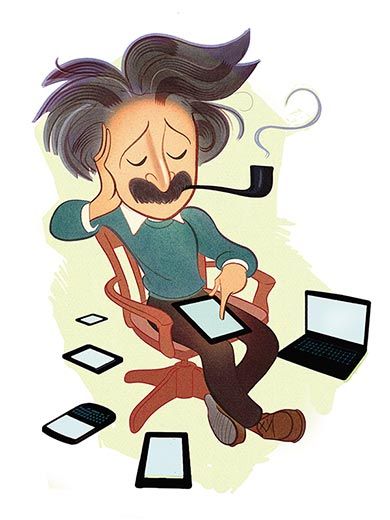Turn on, Log in, Wise up
If the internet is dumbing us down, how come I’ve never felt smarter?
/https://tf-cmsv2-smithsonianmag-media.s3.amazonaws.com/filer/Last-Page-Internet-dumbing-us-down-631.jpg)
A friend told me about some research that shows the Internet is making us all stupid. She didn’t actually tell me. She tweeted, and it ended up on my Facebook wall. Soon I received similar alerts on my other social networking hangouts, so I knew something was up. That’s how people stay informed nowadays: if the news is important, it will find us.
It didn’t take me long to track down the research. It was all over the Web—in blog posts, newspaper articles and a new book, The Shallows: What the Internet Is Doing to Our Brains, by Nicholas Carr, a technology writer. The gist is that constant bombardment by Internet stimuli is rewiring our brains—for the worse. We’re losing our ability to read a book, retain information, follow a line of argument and make critical judgments. All we can do now is flit like a hummingbird from Google to YouTube to Reddit, without making much sense of it all. Carr writes about his own inability to concentrate amid all the hypertext links, new-mail pings and blinking banner ads.
I feel sorry for the guy. It must have been hard to write a whole blinking book when he has a tech blog to maintain, apps to download and tweets to re-tweet. Yet I don’t buy his argument. My brain certainly does not feel feebler these days. I have no trouble following arguments on the political Web sites I frequent, and boy do they love to argue there! I remember every joke, quiz and “you-won’t-believe-this” news article my friends send me. (I’d be lost without my friends, especially the ones I’ve never met.) I’m learning stuff all the time.
For instance: I came across that image of the hummingbird while reading about the new research my friend told me about. Not that I read the studies themselves. I merely followed a link from a tweet to a wall post to a magazine article, stopping several times along the way to check my messages. In fact, the article was not in the magazine’s dead-tree version but on its Web site. There I found some interesting items about songbirds, birdbaths, bath soaps, soap operas, opera capes, Cape Cod and cod-liver oil. These led me, via embedded links, to several other sites with even more interesting trivia before I remembered, an hour or two later, what I was looking for.
On Wikipedia I found the amazing fact that the hummingbird is our only feathered friend that can fly backward. Now there’s a metaphor for you. Perhaps our brains can evolve in more than one direction, which in a way refutes those alarmist researchers. Sure, the Internet may shorten our memories and attention spans. But it can also make us whizzes at typing with our thumbs, tracking down old high-school friends and answering messages while watching last night’s “Daily Show” in a separate window. Just as we survived the advent of the telephone, radio and television—which experts back then warned would fry our brains—the Internet may actually be making us smarter.
I mean, just ask me a question, any question, and in a few seconds I can find the answer for you. Before long, the iPhone, the iPad, the Android and similar hand-held, wireless, Web-connected devices will turn us all into walking Wikipedias.
So when somebody brings up the subject of how the Internet is making us dumber, you can just pull out your cool new phone, look up what I’ve written here and inform your interlocutor that the whole idea is so 15 minutes ago. Indeed, I haven’t received a post or a tweet about the subject in more than 15 minutes, which means it can’t be all that important.
Donald Morrison is the author of The Death of French Culture and is a former editor at Time magazine.
